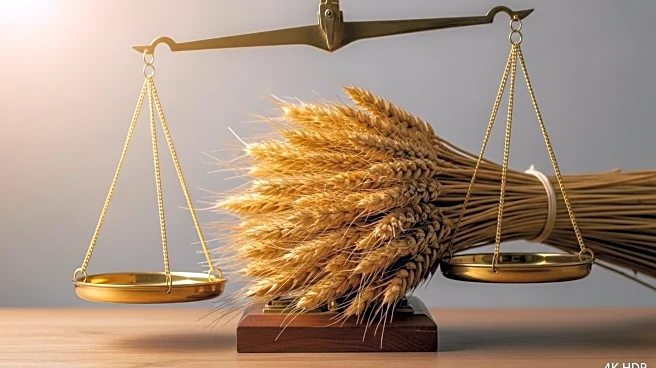What's Happening?
The Sindh government has formally proposed to the Ministry of National Food Security & Research to reinstate a minimum support price for wheat for the 2025-26 season. This move comes after a year of not procuring wheat at the notified minimum support price, which has led to instability in the agricultural sector. Sindh Food Secretary Mohammad Bachal Rahupoto emphasized the importance of a minimum support price to boost farmers' morale and ensure optimal wheat production. The previous season's rate was Rs4,000 per 40kg, and the proposal suggests maintaining or increasing this rate. The Sindh government argues that current wheat stocks are sufficient for the next five to six months, negating the need for imports. The proposal also includes a call for federal support for farmers with small landholdings to promote equitable growth.
Why It's Important?
The reinstatement of a minimum support price for wheat is crucial for stabilizing the agricultural sector in Sindh, which has experienced negative growth following the cessation of government procurement. Farmers have been selling wheat at lower prices, while consumers face high flour costs. The lack of a support price has left farmers vulnerable to market fluctuations, impacting their livelihoods and the broader food security in the region. By advocating for a minimum support price, the Sindh government aims to protect farmers from market volatility and ensure a stable supply of wheat, which is vital for food security. This policy shift could also influence national agricultural policies and potentially affect international trade agreements, especially with organizations like the International Monetary Fund.
What's Next?
The federal government, in consultation with provincial authorities, is expected to approach the International Monetary Fund to discuss the gradual exit from the procurement regime or involve the private sector in a more pragmatic manner. This approach aims to address the vacuum left by the sudden withdrawal from procurement, which has adversely affected farmers. The Sindh government is also considering restructuring its food department to better manage wheat procurement and storage. These steps are part of a broader strategy to stabilize the agricultural sector and ensure food security. The outcome of these discussions and policy implementations will be closely watched by stakeholders, including farmers, consumers, and international trade partners.
Beyond the Headlines
The proposal to reinstate a minimum support price for wheat highlights deeper issues within the agricultural sector, such as the need for systemic reforms to address corruption and inefficiencies in procurement processes. Historically, the wheat procurement exercise in Sindh has been marred by corruption, with support prices reaching only a fraction of small farmers. The Sindh government's push for policy changes could lead to long-term shifts in how agricultural support is structured, potentially setting a precedent for other regions. Additionally, the financial implications of past procurement practices, including significant debts owed to the State Bank of Pakistan, underscore the need for sustainable financial management within the sector.









